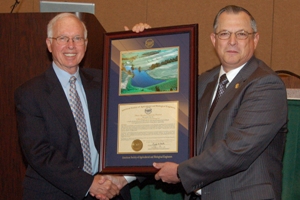Since 1948, over 11,000 dams and associated conservation practices in more than 2,000 watershed projects encompassing 160 million acres in 47 states have been constructed as a part of the USDA Small Watershed Program. These projects have improved the quality of life and the environment in rural communities by protecting people's lives and property, conserving soil and water resources, reducing flooding, providing economic development, recreation, and water supplies, enhancing water quality, and improving wetlands and wildlife habitat. The Program established the principle of combining conservation practices in a watershed with flood control dams on tributary streams. In order to implement this program, innovations in engineering, hydraulics, hydrology, and soil mechanics were developed by USDA Soil Conservation Service (now Natural Resources Conservation Service) and Agricultural Research Service engineers and scientists. The program was created by the Flood Control Acts of 1936 and 1944 and expanded nationwide by the Watershed Protection and Flood Prevention Act of 1954. Oklahoma is a national leader in the Small Watershed Program with several national "firsts", including the first dam constructed in July 1948 and the first dam rehabilitated in April 2000.



